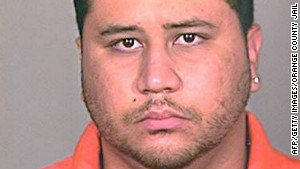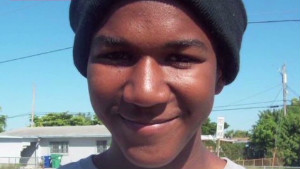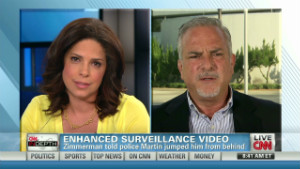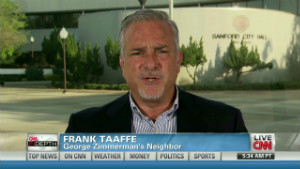
Study: Republicans, whites
more tired of
Trayvon Martin coverage
updated 12:30 PM EDT, Thu April 5, 2012STORY HIGHLIGHTS
- Report: 56% of Republicans and 25% of Democrats say there is too much Martin coverage
- Considerably more whites than blacks say the same thing, according to the study
- A friend of George Zimmerman defends the neighborhood watch volunteer
- Rallies nationwide have called for Zimmerman's arrest
"AC360°" teams up with a child psychologist to see what factors contribute to children's opinions on race. Could these same factors have shaped how you view race? The special report, "Kids on Race: The Hidden Truth," continues at 8 p.m. ET Wednesday on CNN.
Sanford, Florida (CNN) -- While the story behind Trayvon Martin's shooting death continues to grab headlines, interest in the case is sharply divided along partisan and racial lines, according to a new study by Pew Research Center.
Far more Republicans (56%) than Democrats (25%) say there has been too much coverage of Martin's death, according to Pew, which surveyed a "nationally representative sample of 1,000 adults" last Thursday through Sunday about top new stories.
In addition, 43% of whites said the story has garnered too much coverage, compared with just 16% of blacks, Pew said.
Martin's death fractured not just public interest opinions; it also continues to divide supporters of the slain Florida teen and those of George Zimmerman, the man who admitted killing the 17-year-old but claims he did so in self-defense.

Zimmerman attorneys say media unfair

Trayvon Martin's last minutes
Taaffe: Zimmerman welts 'clear' on tape

Taaffe: Martin shooting 'a perfect storm'
Rallies nationwide have called for Zimmerman's arrest, decrying the Sanford Police Department's handling of the case.
On Tuesday, Martin family attorney Jasmine Rand insisted again that a former prosecutor in the case, State Attorney Norm Wolfinger, met with the now sidelined Sanford police Chief Bill Lee the night of the killing and overruled a police detective urging that Zimmerman be arrested.
Rand said the family's legal team has multiple, credible sources who say Wolfinger and Lee met that night. She declined to elaborate.
FBI agents were in Sanford on Tuesday, continuing their interviews in a civil rights investigation. Martin family supporters say the situation is a clear-cut case of racial profiling leading to an unjust killing.
On Monday, agents interviewed Martin's girlfriend, the 16-year-old girl who, phone records show, was on the line with him shortly before the fatal confrontation, Martin family attorney Daryl Parks confirmed Tuesday.
Martin's family and supporters say Zimmerman, who is Hispanic, profiled Martin, who was black, as "suspicious" and ignored a police dispatcher's request that he not follow him. Martin had a bag of Skittles and an iced tea at the time of his death.
The 28-year-old neighborhood watch volunteer has said Martin punched him and slammed his head into a sidewalk before the shooting, according to family members and police.
Zimmerman's legal adviser, Craig Sonner, said Tuesday that criminal defense lawyer Hal Uhrig would represent Zimmerman and that Sonner would serve as co-counsel if the case were to proceed. Uhrig spent more than six years with the Gainesville Police Department in Florida before graduating from law school in 1974.
Meanwhile, a friend of Zimmerman's said video of the neighborhood watch volunteer in police custody does seem to show injuries consistent with Zimmerman's report that Martin slammed his head to the concrete after the two exchanged words.
An enhanced copy of the video appears to show a bump, mark or injury on Zimmerman's head more clearly than does another copy of the video previously reviewed by CNN. That video had a grainy quality.
While the video does not appear to show major wounds, Frank Taaffe, Zimmerman's neighbor and friend, said Seminole County paramedics cared for Zimmerman before they released him to police.
"That's why you don't see him like he came out of a 12-round fight like Rocky Balboa against Apollo Creed," Taaffe said.
But Rand, the Martin family attorney, said Tuesday that it doesn't matter what the videotape shows.
"That does not change our position," she said. "Once again, George Zimmerman was the aggressor. He pursued Trayvon in this instance. If he did have any medical injuries, that did not give him the right to use deadly force and shoot and kill Trayvon."
Also Tuesday, Taaffe told CNN that the neighborhood had experienced a spate of burglaries over 15 months, which he said were committed by black men. But Taaffe said Zimmerman was not a racist.
"Young black men were never the topic of discussion," he said. It was that neighborhood homes had been repeatedly burglarized, he said.
Police records didn't appear to support Taaffe's assertion, describing four incidents involving black men. Taaffe declined further comment to CNN.
CNN's Vivian Kuo, Holly Yan, Tracy Sabo and Natisha Lance contributed to this report.
Watch Anderson Cooper 360° weeknights 10pm ET. For the latest from AC360° click here.
__________________________
From Emmett Till
to Trayvon Martin:
How Black Women
Turn Grief Into Action
April 3, 2012 by Barbara McCaskill ·

We cannot get the anguished face of Sybrina Fulton, the mother of unarmed teenager Trayvon Martin–who was gunned down by a self-appointed neighborhood watch volunteer in Sanford, Fla., in late February–out of our minds. Her suffering and indignation–along with that of Trayvon’s father, Tracy Martin–has galvanized citizens of diverse races, classes, religions and generations to organize rallies, petitions, hoodie marches and social media campaigns raising awareness of violence and bias against African Americans.
There are resonances here to another grieving, anguished mother, Mamie Till. In the summer of 1955, her son Emmett was lynched while visiting relatives in the Mississippi Delta. Till persuaded national and international print publications to run photographs of her son’s bloated, battered corpse before a shocked and outraged public. Concurrent with such mourning, writes Duke University professor Karla F. C. Holloway, has been a longstanding understanding of “the nexus between a black family’s grief and African America’s national experience.” In her 2002 book Passed On: African American Mourning Stories:A Memorial, she describes “African Americans’ particular vulnerability to an untimely death in the United States” and “how we die a color-coded death—the residue of riots, executions, suicides and targeted medical neglect.” Holloway’s theme is personal: She mourns her own black son’s death by homicide.
In these charged public responses to the private “residue” of death, I’m reminded of another way in which grief and national experience have intersected with black women’s lives. In the late 19th and early 20th century United States, lynch mobs in the South murdered African American men on a weekly basis. As the essays of Gender and Lynching: The Politics of Memory, edited by political scientist Evelyn M. Simien, tell us, African American women and children were also victims of these brutalities.
 Outraged by the violence and stereotyping that sanctioned this terror,journalist Ida B. Wells-Barnett (1862-1931) and educator Anna Julia Cooper (1858-1964) cultivated what feminist scholar Patricia Hill Collinshas called “a recursive relationship between … intellectual and political work.” In their respective 1892 publications Southern Horrors: Lynch Law in All Its Phases and A Voice from the South. By a Woman of the South, Wells-Barnett and Cooper educated white American men about how the suppression of blacks’ economic success and political activism was the true reason for most lynchings of black fathers and sons–rather than the spurious claim that they raped white women. The authors urged white American women to recognize how ending racial and sexual violence and gaining suffrage and other political rights were complementary rather than exclusive goals. They participated in and helped organize interracial campaigns and boycotts in order to publicize lynching atrocities and press for a national anti-lynching law.
Outraged by the violence and stereotyping that sanctioned this terror,journalist Ida B. Wells-Barnett (1862-1931) and educator Anna Julia Cooper (1858-1964) cultivated what feminist scholar Patricia Hill Collinshas called “a recursive relationship between … intellectual and political work.” In their respective 1892 publications Southern Horrors: Lynch Law in All Its Phases and A Voice from the South. By a Woman of the South, Wells-Barnett and Cooper educated white American men about how the suppression of blacks’ economic success and political activism was the true reason for most lynchings of black fathers and sons–rather than the spurious claim that they raped white women. The authors urged white American women to recognize how ending racial and sexual violence and gaining suffrage and other political rights were complementary rather than exclusive goals. They participated in and helped organize interracial campaigns and boycotts in order to publicize lynching atrocities and press for a national anti-lynching law.
Similarly, as Koritha Mitchell writes in Living with Lynching: Afrincan American Lynching Plays, Performances, and Citizenship, 1890-1930, black women writers of the Progressive Era, such as Angelina Weld Grimké (1880-1958) and Georgia Douglas Johnson (1880-1966), created lynching plays to help black audiences survive the destructive effects of the mob on their homes and families.
By confronting a somnolent nation with the consequences of bigotry and fear, then stirring citizens into action, African American feminists have stood our ground, turning acts of violence and victimhood into opportunities for empowerment and advocacy. We’ve worked within black communities to develop anti-racist and anti-sexist strategies. We’ve claimed what Collins calls in Black Feminist Thought an “outsider-within” position “whose marginality provides a distinct angle of vision” on the politics of power and authority. This has enabled us to save our lives and communities by calling out the people, perceptions and policies that mask or deny the realities of African Americans’ experiences.
Take the example of what happened in 1979 when 12 black women and one white woman were murdered in Boston. Barbara Smith and other members of the black feminist Combahee River Collective organized self-defense workshops. They pressured the police and media to act as if the bodies and minds of blacks and women mattered. Also in 1979, and over the next two years, at least 28 black children and young adults—primarily young black men—were murdered in Atlanta. Here again, black women channeled sorrow into community responses that included increased knowledge about pedophilia and safe houses for latchkey children, and a public outcry that led to the eventual life conviction of Wayne Williams for two of the deaths. Black women novelists such as Toni Cade Bambara (These Bones are Not My Child) and Tayari Jones (Leaving Atlanta) have kept such contemporary stories alive as a kind of literary activism.
Why have black women so often stood at the forefront of such protests? Behind this history may be the lingering legacies of the sassy Sapphire and the mouthy Mammy. These stereotypes, historically used to justify our oppression, cast us as angry, loud, pushy and overassertive. Part of the work of black feminism has been to reclaim these negative attributes and reframe them as positive sources of women’s autonomy and empowerment. Black women can reinterpret “pushy” as “one who speaks truth to power” and use it as a source of strength.
Another reason may be social perceptions of us as less violent than black men. In her forthcoming study, “Girls on the Front Line: Gender and the Battle to Desegregate Public Schools in the United States,” historian Rachel Devlinhas found that civil rights organizations in the 1950s and early 1960s chose a disproportionate number of black girls to desegregate schools and colleges, in part because of this perception of our being less physically threatening than our male counterparts. In cases of murder and lynching, we can again leverage this stereotype, displaying our grief in order to humanize our dead husbands, sons and fathers in the public eye.
Because of such efforts, the world knows Trayvon Martin now. This largely is a consequence of his mother and father standing their ground, passionately resisting an injustice. Hopefully, more American women and men now know and recognize that by standing against hate and fury, and for racial tolerance, we build a meaning of America that is not exclusively yours or mine, but ours and everyone’s.
Support Sybrina Fulton by demanding that her son’s killer be arrested–sign the Care2 petition below:
TOP LEFT: Photo of Sybrina Fulton from Flick user David Shankbone under Creative Commons 2.0.
MIDDLE LEFT: Photo of feminist educator Anna Julia Cooper from Wikimedia Commons under Creative Commons 2.0.
>via: http://msmagazine.com/blog/blog/2012/04/03/from-emmett-till-to-trayvon-martin...
__________________________
Armed neo-Nazis
patrol the streets of Sanford,
looking for race riots
Friday, April 6, 2012

Heavily armed neo-Nazis are said to be patrolling the streets of Sanford, Florida to protect “white citizens in the area” in case of race riots.
According to a blog at the Miami New Times, the patrols were initiated by Jeff Schoep of the Detroit-based National Socialist Movement in response to the shooting of African-American teen Trayvon Martin by self-appointed neighborhood vigilante George Zimmerman.
“We are not advocating any type of violence or attacks on anybody,” Schoep insists, “but we are prepared for it,. We are not the type of white people who are going to be walked all over.”
“Because nothing diffuses racial tension,” blogger Michael Miller comments wryly, “like gun-toting racial separatists patrolling an already on-edge commnity.”
Schoep is described by the Southern Poverty Law Center, which monitors extremist hate groups, as “a neo-Nazi true believer since age 10 who has managed, largely by luck, to end up heading one of the largest explicitly Hitlerite groups in America. Schoep’s group is known for the crudeness of its propaganda, the violence it works hard to provoke, and the faux SS outfits that have caused many other neo-Nazis to deride NSM members as ‘Hollywood Nazis.’”
Schoep’s group is best known for the rally it staged against “black crime” in an inner-city neighborhood of Toledo, Ohio in 2005. NSM members had to be rescued from an angry crowd by the police, and the day ended with some local residents attacking police and 100 being arrested. The NSM considered this outcome a great success.
Schoep asserts that he and the Florida residents he has recruited are acting “totally within the law” and that their patrols “wouldn’t intimidate anybody” and are simply meant as a “show of solidarity with the white community down there.”
He says he decided to launch the Sanford patrols following an offer by the New Black Panther Party to pay a $10,000 bounty for a citizen’s arrest of Zimmerman, which he took as proof that “the possibility of further racial violence… is brimming over like a powder keg ready to explode into the streets.”
“We are a white civil rights organization,” Schoep said of the National Socialist Movement, describing himself as a while equivalent of Reverend Al Sharpton. He added that he wasn’t even taking sides on the shooting because Zimmerman is “half Hispanic or Cuban or something. He certainly doesn’t look white to me.”
Photo of NSM rally by Josh LaClair via Flickr

Muriel Kane is an associate editor at Raw Story. She joined Raw Story as a researcher in 2005, with a particular focus on the Jack Abramoff affair and other Bush administration scandals. She worked extensively with former investigative news managing editor Larisa Alexandrovna, with whom she has co-written numerous articles in addition to her own work. Prior to her association with Raw Story, she spent many years as an independent researcher and writer with a particular focus on history, literature, and contemporary social and political attitudes. Follow her on Twitter at @Muriel_Kane
__________________________
Armed Neo-Nazis
Now Patrolling Sanford,
Say They Are "Prepared" For
Post-Trayvon Martin Violence
By Michael Miller -
 |
| nsm88.org |
| Members of the National Socialist Movement during a patrol on the US-Mexico border in January |
Neo-Nazis are currently conducting heavily armed patrols in and around Sanford, Florida and are "prepared" for violence in the case of a race riot. The patrols are to protect "white citizens in the area who are concerned for their safety" in the wake of the Trayvon Martin shooting last month, says Commander Jeff Schoep of the National Socialist Movement. "We are not advocating any type of violence or attacks on anybody, but we are prepared for it," he says. "We are not the type of white people who are going to be walked all over." Because nothing diffuses racial tension like gun-toting racial separatists patrolling an already on-edge community. Schoep, whose neo-Nazi group is based in Detroit, tells Riptide the patrols are a response to white residents' fears of a race riot.
A group called the New Black Panther Party recently offered $10,000 for a citizens' arrest of George Zimmerman, Martin's shooter. Schoep said the bounty is a sign that "the possibility of further racial violence... is brimming over like a powder keg ready to explode into the streets."
The patrols are comprised of between 10 and 20 locals and "volunteers" from across the state, including some from Miami, he added. He couldn't go into specifics on what kind of firepower, exactly, the patrols had with them.
 |
| nsm88.org |
| NSM members on patrol in Arizona |
"In Arizona the guys can walk around with assault weapons and that's totally legal," Schoep said, referring to the group's patrols of the US-Mexico border. "What I can tell you is that any patrols that we are doing now in Florida are totally within the law."
Asked if the patrols wouldn't just make things worse -- spark a race riot, for instance -- Schoep insisted they were simply a "show of solidarity with the white community down there" and "wouldn't intimidate anybody." "Whenever there is one of these racially charged events, Al Sharpton goes wherever blacks need him," Schoep said. "We do similar things. We are a white civil rights organization." He went to great lengths to contrast his organization with the New Black Panther Party, who he blamed for scaring local whites and spurring the need for NSM patrols. Schoep admits that the NSM and the Black Panthers are actually alike in that they are both racial separatists. But he sees a double-standard in the government's treatment of the two groups. "The Black Panthers have been offering bounties and all that," he says. "But if we called for a bounty on someone's head, I guarantee we'd be locked up as quick as I could walk out of my house." |
| nsm88.org |
| A photo from NSM's website |
Schoep was also quick to clarify that he isn't taking sides in Trayvon Martin's controversial shooting. "That's for the courts to decide," he says. Besides, Schoep says, Zimmerman's not even white.
"I think there is some confusion going on," Schoep says. "A lot of people think that this guy who shot Trayvon was white... but he's half Hispanic or Cuban or something. He certainly doesn't look white to me." To some, sending in the storm troops seems like a sure way to incite -- not prevent -- a race riot. But Schoep says that's way off base. "We don't wish for things like that," he says. "But there have been race riots in Detroit and L.A... So we know those types of things happen." "You can either be prepared or you can be blindsided," he adds. "This way, if something were to touch off a race riot, we'd already be in the area." How reassuring. Follow Miami New Times on Facebook and Twitter @MiamiNewTimes. Follow this journalist on Twitter @MikeMillerMiami.>via: http://blogs.miaminewtimes.com/riptide/2012/04/heavily_armed_neo-nazis_patrol...

